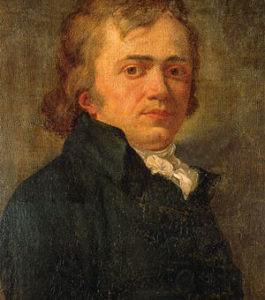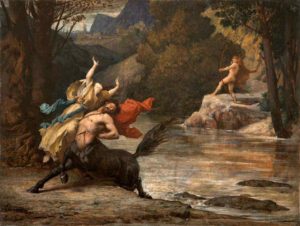Categories
Hercules
ANDRÉ CHÉNIER (1762-94)
Oeta, mont ennobli par cette nuit ardente,
Quand l’infidèle époux d’une épouse imprudente
Reçut de son amour un présent trop jaloux,
Victime du centaure immolé par ses coups.
Il brise tes forêts : ta cime épaisse et sombre
En un bûcher immense amoncelle sans nombre
Les sapins résineux que son bras a ployés.
Il y porte la flamme ; il monte, sous ses pieds
Étend du vieux lion la dépouille héroïque,
Et l’oeil au ciel, la main sur la massue antique
Attend sa récompense et l’heure d’être un dieu.
Le vent souffle et mugit. Le bûcher tout en feu
Brille autour du héros, et la flamme rapide
Porte aux palais divins l’âme du grand Alcide !
Hercules
Oeta, by flames at midnight glorified,
When feckless husband from unwitting bride
Received love’s jealous gift: his doom, to slay
The Centaur, yet at last to fall its prey:
He breaks your forests; and your dense dark crest
Heaps up the countless pines his arm depressed
Into a resinous gigantic pyre.
He kindles it. Beneath him, climbing higher,
His hero’s pelt, old lion-skin, he lays;
Grasps his rough club, awaits with upturned gaze
His imminent reward of deity.
The stormwind roars; the blaze more torridly
Shines round the hero, and the fiery breeze
Bears heavenward the soul of Hercules!
 Translation: Copyright © Timothy Adès
Published in Classical Association News, and online in Poetry Atlas.
Milton describes the frenzy of Hercules:
As when Alcides (i.e., Hercules) from Oechalia crowned
With conquest, felt the envenomed robe, and tore,
Through pain, up by the roots Thessalian pines
And Lichas from the top of Oeta threw
Into the Euboic Sea.
Oeta is a mountain in Thessaly.
Hercules and Deianeira were to marry. The centaur, Nessus, assaulted her and Hercules shot him. The dying Nessus persuaded her to spread his blood on Hercules’ shirt, as a love-potion: but it was a searing poison. Years later, jealous of two other women, she used it. Hercules, as a son of Zeus, can be seen in the night sky.
Translation: Copyright © Timothy Adès
Published in Classical Association News, and online in Poetry Atlas.
Milton describes the frenzy of Hercules:
As when Alcides (i.e., Hercules) from Oechalia crowned
With conquest, felt the envenomed robe, and tore,
Through pain, up by the roots Thessalian pines
And Lichas from the top of Oeta threw
Into the Euboic Sea.
Oeta is a mountain in Thessaly.
Hercules and Deianeira were to marry. The centaur, Nessus, assaulted her and Hercules shot him. The dying Nessus persuaded her to spread his blood on Hercules’ shirt, as a love-potion: but it was a searing poison. Years later, jealous of two other women, she used it. Hercules, as a son of Zeus, can be seen in the night sky.Translation: Copyright © Timothy Adès